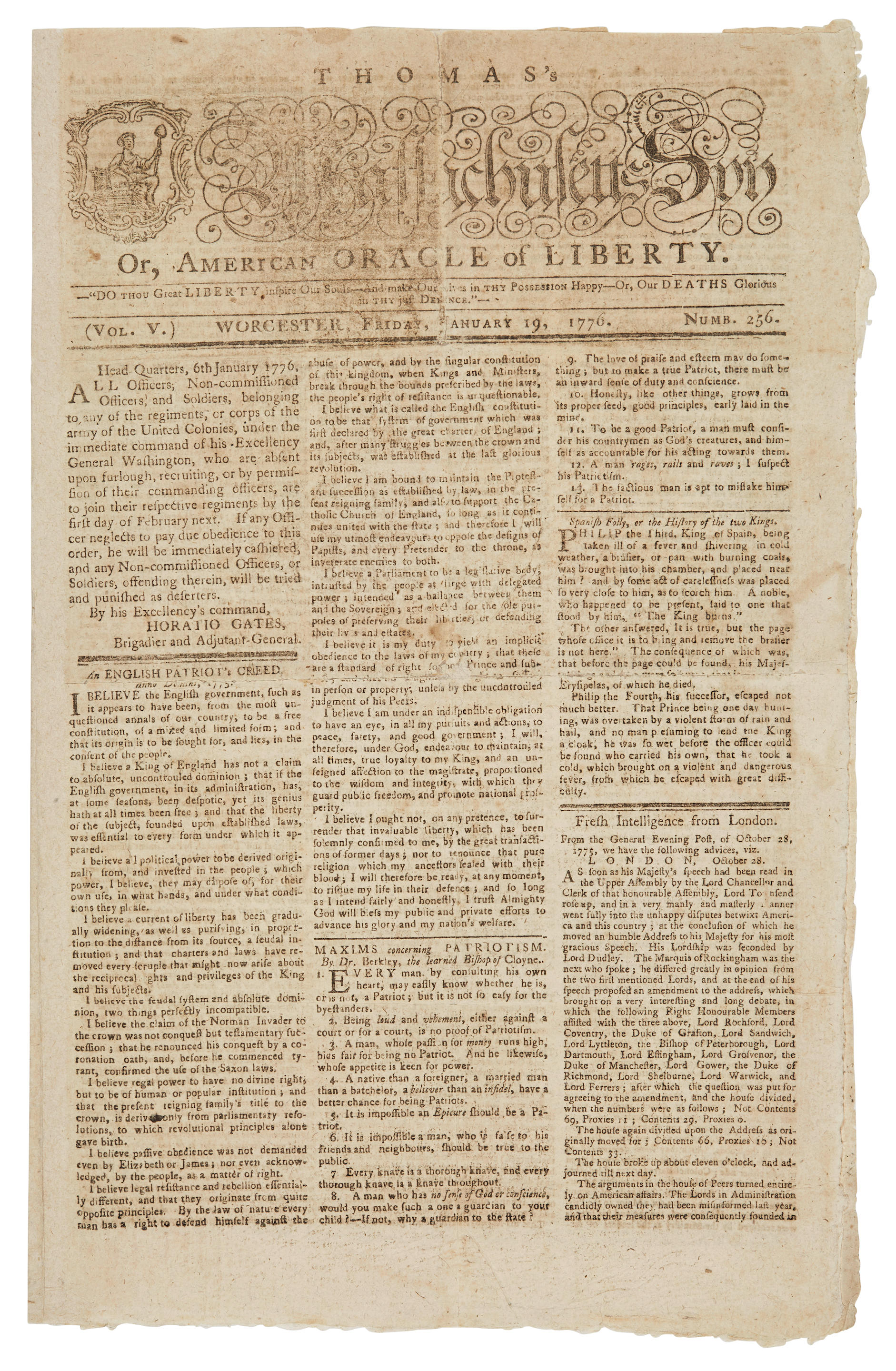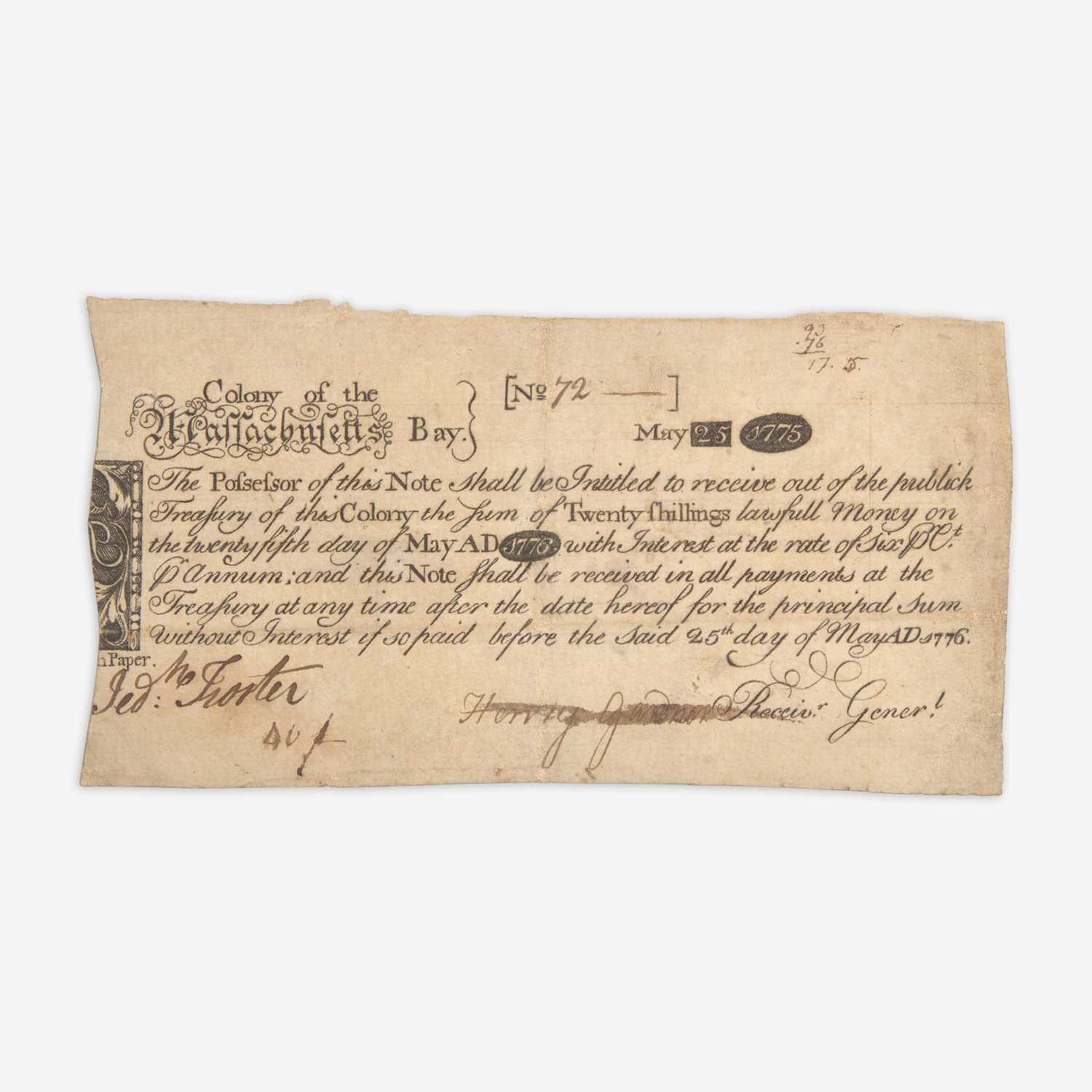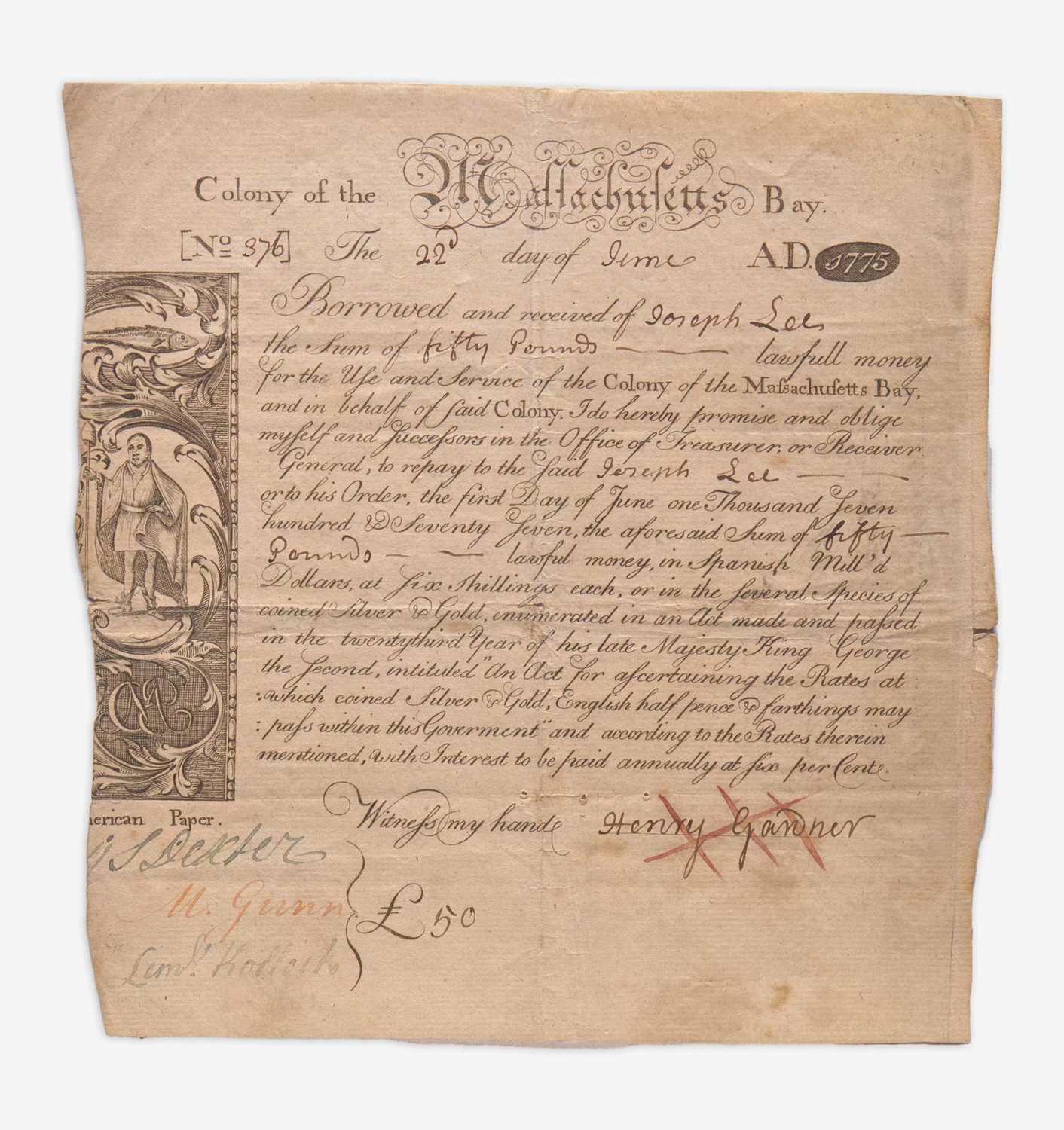REVERE, Paul (1735-1818), Massachusetts patriot . Autograph document signed ("Paul Revere," in text), WITH A 19-WORD AUTOGRAPH ENDORSEMENT BY JOHN HANCOCK, (n.p. [Boston, Massachusetts], 3 [Janu]ary [17]74. 1 page, oblong 4to (6¼ x 7 5/16 in.), left-hand edge torn and repaired with loss of several letters of date, in a red morocco gilt-lettered protective case. CARRYING THE SPARK OF REBELLION FROM COLONY TO COLONY: THE ORIGINAL BILL FOR PAUL REVERE'S FIRST REVOLUTIONARY RIDE, CARRYING NEWS OF THE BOSTON TEA PARTY (IN WHICH REVERE WAS A PARTICIPANT) TO NEW YORK The Boston Tea Party--the earliest organized colonial act of resistance to British rule--remains one of the pivotal incidents of the Revolutionary War, memorable for its audacity, its unprecedented success and for the fact that the Boston patriots who planned and carried it out disguised themselves as Native Americans. Most importantly though, the Boston Tea Party was the critical event which irrevocably fanned the smoldering coals of resentment in the colonies into overt, organized resistance to British authority. Furthermore, the British response to the Tea Party furnished the immediate incentive for the formation of the Continental Congress, which ultimately declared the colonies' independence from Great Britain. As one historian contends, "for three years before the Tea Party, the thirteen American colonies shared no common cause, and relations between them and the mother country were relatively calm. Within eighteen months after the Tea Party the colonies were united in war against Great Britain. The Boston Tea Party was the catalyst that brought about this revolutionary change" (Benjamin Woods Larrabee, The Boston Tea Party , Oxford: Oxford University Press, 1966, p.8). The document is neatly drawn up by Revere in the form of a simple list, boldly headed "The Committee of Correspondence to Paul Revere"; beneath is a simple statement consisting of four lines of itemized expenses: "To my Expences from Boston to New-York," and "Back to Boston," totaling £4. 10s. "Horse hire" for the trip is billed at £4. 16s., the exact amount Revere charges the Committee for "My time." Beneath is his total, in lawful money, £14. 2s. Below Revere's account, in a small, neat clerical hand, is the notation "Allowed." (The same unidentified clerk made an identical notation on Revere's bill for his September 1775 ride to New York, carrying the Suffolk Resolves [see below]). Finally, connecting the document and the event to one of the seminal figures of the American Revolution, is a boldly penned endorsement of patriot John Hancock reading: "The Draft to be in fav[our]. [of] John Hancock he having paid Mr. Revere the money by [o]rder of Selectmen." The Townshend Acts of 1767 represented a last attempt of the British Parliament to levy a revenue tax on the American colonies. Massachusetts, led by the Boston Whigs, responded by adopting non-importation agreements, and appealed to other colonies for similar boycotts (New York readily acquiesced, while Pennsylvania did not). But while most of the revenue taxes were repealed by Parliament, the tea tax remained in effect. In September 1773, The East India Company (whose warehouses were stuffed with an enormous surplus of unsold tea) dispatched a sizeable shipment of dutied tea--more than 2000 chests, some 600,000 pounds--to four American ports, including Boston. When they learned of the shipment, patriot leaders resolved that the tea would not be permitted to land, nor would the duty be paid. The tea ships were refused dockage and turned back in New York and at Philadelphia, while in Charleston the tea was seized and placed in storage. But in Boston, which possessed a particularly vocal and active group of patriots, the Board of Selectmen, including Sam Adams, Joseph Warren and John Hancock defiantly voted to oppose the landing of the cargo. Governor Hutchinson persisted in his intention to land the cargo. Finally, on the night of December
REVERE, Paul (1735-1818), Massachusetts patriot . Autograph document signed ("Paul Revere," in text), WITH A 19-WORD AUTOGRAPH ENDORSEMENT BY JOHN HANCOCK, (n.p. [Boston, Massachusetts], 3 [Janu]ary [17]74. 1 page, oblong 4to (6¼ x 7 5/16 in.), left-hand edge torn and repaired with loss of several letters of date, in a red morocco gilt-lettered protective case. CARRYING THE SPARK OF REBELLION FROM COLONY TO COLONY: THE ORIGINAL BILL FOR PAUL REVERE'S FIRST REVOLUTIONARY RIDE, CARRYING NEWS OF THE BOSTON TEA PARTY (IN WHICH REVERE WAS A PARTICIPANT) TO NEW YORK The Boston Tea Party--the earliest organized colonial act of resistance to British rule--remains one of the pivotal incidents of the Revolutionary War, memorable for its audacity, its unprecedented success and for the fact that the Boston patriots who planned and carried it out disguised themselves as Native Americans. Most importantly though, the Boston Tea Party was the critical event which irrevocably fanned the smoldering coals of resentment in the colonies into overt, organized resistance to British authority. Furthermore, the British response to the Tea Party furnished the immediate incentive for the formation of the Continental Congress, which ultimately declared the colonies' independence from Great Britain. As one historian contends, "for three years before the Tea Party, the thirteen American colonies shared no common cause, and relations between them and the mother country were relatively calm. Within eighteen months after the Tea Party the colonies were united in war against Great Britain. The Boston Tea Party was the catalyst that brought about this revolutionary change" (Benjamin Woods Larrabee, The Boston Tea Party , Oxford: Oxford University Press, 1966, p.8). The document is neatly drawn up by Revere in the form of a simple list, boldly headed "The Committee of Correspondence to Paul Revere"; beneath is a simple statement consisting of four lines of itemized expenses: "To my Expences from Boston to New-York," and "Back to Boston," totaling £4. 10s. "Horse hire" for the trip is billed at £4. 16s., the exact amount Revere charges the Committee for "My time." Beneath is his total, in lawful money, £14. 2s. Below Revere's account, in a small, neat clerical hand, is the notation "Allowed." (The same unidentified clerk made an identical notation on Revere's bill for his September 1775 ride to New York, carrying the Suffolk Resolves [see below]). Finally, connecting the document and the event to one of the seminal figures of the American Revolution, is a boldly penned endorsement of patriot John Hancock reading: "The Draft to be in fav[our]. [of] John Hancock he having paid Mr. Revere the money by [o]rder of Selectmen." The Townshend Acts of 1767 represented a last attempt of the British Parliament to levy a revenue tax on the American colonies. Massachusetts, led by the Boston Whigs, responded by adopting non-importation agreements, and appealed to other colonies for similar boycotts (New York readily acquiesced, while Pennsylvania did not). But while most of the revenue taxes were repealed by Parliament, the tea tax remained in effect. In September 1773, The East India Company (whose warehouses were stuffed with an enormous surplus of unsold tea) dispatched a sizeable shipment of dutied tea--more than 2000 chests, some 600,000 pounds--to four American ports, including Boston. When they learned of the shipment, patriot leaders resolved that the tea would not be permitted to land, nor would the duty be paid. The tea ships were refused dockage and turned back in New York and at Philadelphia, while in Charleston the tea was seized and placed in storage. But in Boston, which possessed a particularly vocal and active group of patriots, the Board of Selectmen, including Sam Adams, Joseph Warren and John Hancock defiantly voted to oppose the landing of the cargo. Governor Hutchinson persisted in his intention to land the cargo. Finally, on the night of December








.jpg)






Try LotSearch and its premium features for 7 days - without any costs!
Be notified automatically about new items in upcoming auctions.
Create an alert